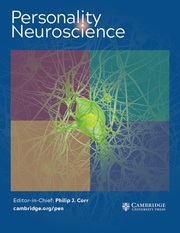-
- You have access: full
- Open access
Editor
Dr Philip J. Corr, City, University of London, UK
Assistant Editor
Dr Dean Mobbs, California Institute of Technology, USA
Editorial Board
Professor Simon Baron-Cohen, University of Cambridge, UK
Professor Timothy Bates, University of Edinburgh, UK
Dr Roger Beaty, Harvard University, USA
Dr Tom Booth, University of Edinburgh, UK
Dr Joshua W. Buckholtz, Harvard University, USA
Professor Turhan Canli, Stony Brook University, USA
Professor Ian Deary, University of Edinburgh, UK
Professor Richard Depue, Cornell University, USA
Professor Colin DeYoung, University of Minnesota, USA
Professor Florin Dolcos, University of Illinois, USA
Professor Ulrich Ettinger, University of Bonn, Germany
Professor Brian W. Haas, University of Georgia, USA
Professor Richard Haier, University of California, Irvine, USA
Professor Wendy Johnson, University of Edinburgh, UK
Professor Robert F. Krueger, University of Minnesota, USA
Dr Robert Latzman, Georgia State University, USA
Professor Klaus-Peter Lesch, University of Wuerzburg, Germany
Professor Neil McNaughton, University of Otago, New Zealand
Professor Christian Montag, University of Ulm, Germany
Professor Marcus Munafo, University of Bristol, UK
Professor Jaak Panksepp, Bowling Green University, USA
Dr Luca Passamonti, University of Cambridge, UK
Professor Alan Pickering, Goldsmiths, University of London, UK
Professor Robert Plomin, King’s College London, UK
Professor Adrian Raine, University of Pennsylvania, USA
Professor Martin Reuter, University of Bonn, Germany
Professor Alex Shackman, University of Maryland, USA
Professor Jan Wacker, University of Hamburg, Germany
Professor Steve Williams, King’s College London, UK
- ISSN: 2513-9886 (Online)
- Frequency: 1 volume per year

